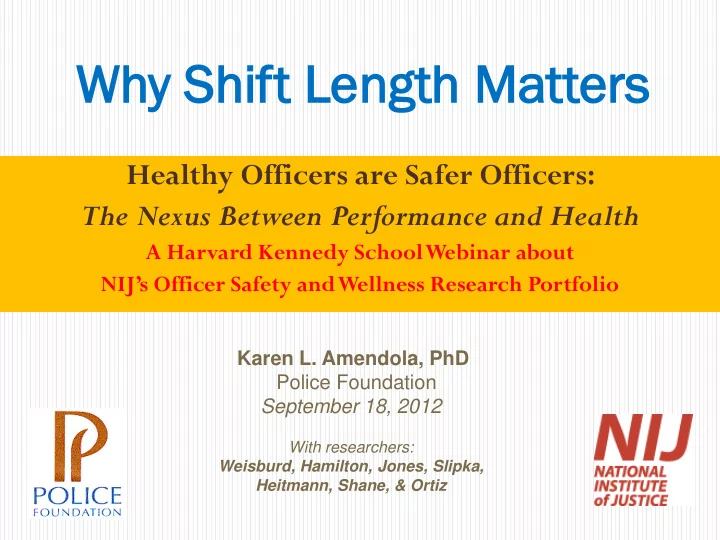

Why Shif Shift L Lengt ngth M h Mat atters Healthy Officers are Safer Officers: The Nexus Between Performance and Health A Harvard Kennedy School Webinar about NIJ’s Officer Safety and Wellness Research Portfolio Karen L. Amendola, PhD Police Foundation September 18, 2012 With researchers: Weisburd, Hamilton, Jones, Slipka, Heitmann, Shane, & Ortiz
Survey and y and Exp Experim iment Random Survey of U.S. Police Agencies’ Current Shift Practices at the end of 2005 & 2009 300 randomly selected agencies (50 or more sworn). 96% response rate in 2005, 100% in 2009. Findings There has been a significant reduction in routinely rotating shifts; 72% now operate on fixed shifts (up from 54% in 2005). Agencies are moving away from traditional 8-hour schedules and trying shifts between 9 and 13 hours. Small agencies favor 8-hour and 12-hour shifts; Large agencies favor 10-hour shifts. Randomized Field Experiment in Two Cities ( Detroit, Michigan and Arlington, Texas) Purpose To assess whether shift length has an impact on safety, health, fatigue, performance, or other critical factors
Sam ample & & Meas asures 326 officers were randomly assigned to either 8-, 10-, or 12-hr shifts, and 275 participated (84%) Measures consisted of surveys, departmental data, logs of sleep and alertness, and laboratory simulations: Shooting simulator Reaction time measure Driving simulator Pupilometer Video vignettes
Results 10-hr shifts had advantages over 8-hr shifts Officers got ½ hour more sleep per night (3.5 hrs/week) Officers liked the shifts better Officers worked significantly less overtime 12-hr shifts did not have these advantages, AND officers on these shifts were sleepier and less alert 8-hr shifts were associated with 5 times more overtime than those on 10s, and 3 times more than those on 12s
Im Implica icatio ions ns Agencies wishing to adopt 10- or 12-hr shifts should not be too concerned about performance problems. However, agencies wishing to adopt 12-hr shifts should proceed with caution because 12-hr officers were more sleepy and less alert Past research suggests increased safety hazards, particularly when combining them with more than 48 hrs of work per week Agencies moving to 12-hr shifts should consider Restricting or more closely monitoring overtime and off-duty Establishing policies on sleep and fatigue Cost savings related to overtime may be realized by agencies using 10- or 12-hour shifts.
Que uestions ions? For additional copies of these and other reports, go to: http://policefoundation.org/indexShiftExperiment.html Karen L. Amendola, PhD kamendola@policefoundation.org (202) 833-1460
Recommend
More recommend